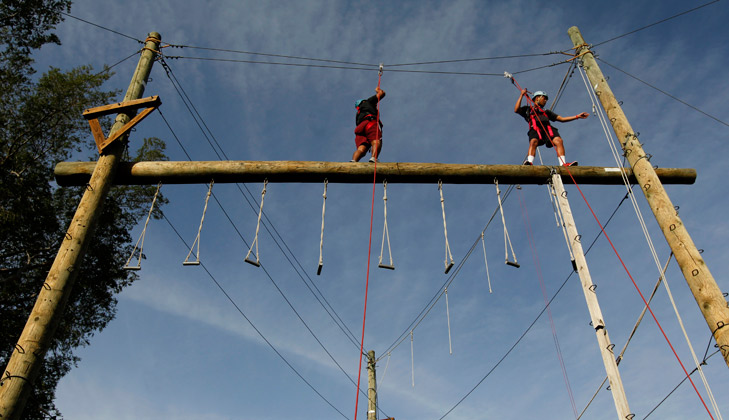On the Fresno State campus, it’s hard to miss the E.D.G.E. Challenge Ropes Course just west of the Henry Madden Library. In a grassy field, tall wooden beams protrude 25 to 50 feet from the ground with ropes and cables that interconnect each beam together. Since the early ’90s, the high-flying ropes course has challenged the mind and bodies of both campus and community members. But for now, the ropes course remains empty — a sign of the times, as COVID-19 put a stop to all activities on campus in mid-March.
Even though the in-person activities have come to a halt, the E.D.G.E. course is still taking flight online with interactive courses that participants can complete right in their own homes. Director Ryan Soares said the main component of the course is facilitating programming that teaches leadership, teamwork and collaborative skills — all facets that can also be learned in a virtual environment.
“We knew we had to reinvent the course and programming, and when speaking with our staff, we discovered that what we are really good at is driving home meaningful and purposeful discussion,” Soares said. “Although the ropes course is fun and exciting, the goal of it has always been to evoke conversations and connections among our participants. That’s really the strength of our program.”
Within just a few weeks, Soares and his staff converted several of these ropes course activities into an interactive virtual format, via Zoom.
“While we would never be able to recreate, you know, jumping off the top of the pole for a chicken, what we can do is recreate the discussion that would come from taking a leap of faith to having a difficult conversation with a colleague or a fellow student,” Soares said.
“The thing that we’re learning is that it takes a whole lot more time and energy to create an engaging virtual session than it did to create an engaging ropes course or challenge course setting.”
Throughout its three-plus decades, the E.D.G.E. Challenge Ropes Course has stood tall among the many infrastructure changes on campus. It underwent its own renovation in 2017, adding new features to align with current industry practices in an effort to enhance the overall experience for participants. New poles and cables were installed to turn the high element course into a multiple-person challenge, and new green space added more opportunities for activities on the ground level.
Although the course staff is made up mainly of Fresno State students across various majors, and is housed with the Department of Recreation Administration, the course receives no funding from the University — and relies on its steady stream of clients and programming fees to maintain the E.D.G.E. course. Each year, nearly 5,000 clients experience the E.D.G.E. Serving both Fresno State students and the community, the course is essentially an outdoor classroom and laboratory.
With social distancing rules in place, and adding to the fact that the course typically holds groups of 10 to 400 at one time, continuing the course in a physical space was not possible. In turn, organizers were forced to cancel all of their March and April clients and struggled with how to still pay their 22 staff members
“Our immediate thinking was ‘how are we going to survive?’” Soares said. “Since then, we’ve been a bit like a startup company trying to really reinvent who we are and what we do and how to create a virtual environment. Sixty to 70% of our business comes from the community outside of Fresno State, and it’s those funds that pay for our staff salaries and our equipment maintenance.”
One of the first groups to try out their virtual format were students in the College of Health and Human Services’ Honors Program. Prior to the course taking place, each student was sent a packet of supplies, including blindfolds that each person was instructed to wear for his or her part of the experience.
One by one, each of the 31 students opened their individual packets to reveal a puzzle piece. They were then instructed to go into their breakout groups, and describe individually what their particular puzzle piece felt like. Together the class talked through a problem and as a whole figured out what piece of the puzzle was missing. Each program lasts 60 to 90 minutes, and involves some aspect of developmental team work.
“The virtual ropes course experience for the Honors College course was, in a word, excellent,” said Dr. Jenelle Gilbert, co-faculty of the Honors Program. “Our two facilitators, Ryan and Alex, interacted via Zoom and every class member was thoroughly engaged with the activities and the debriefing that followed it. It was a fun, but educational experience that tested our students’ collaborative and leadership skills in a way that would have not been possible had we done a face-to-face experience.”
Organizers of the E.D.G.E. are also excited to roll out a new component to the programming options, with elements derived from Brené Brown’s highly acclaimed “Dare to Lead” curriculum. The program is intended for professionals who strive to lead with courage and vulnerability in a space that allows for growth and learning.
To learn more about E.D.G.E. programs, including its virtual component and Dare to Lead curriculum, visit its website or contact Ryan Soares at rsoares@csufresno.edu.





